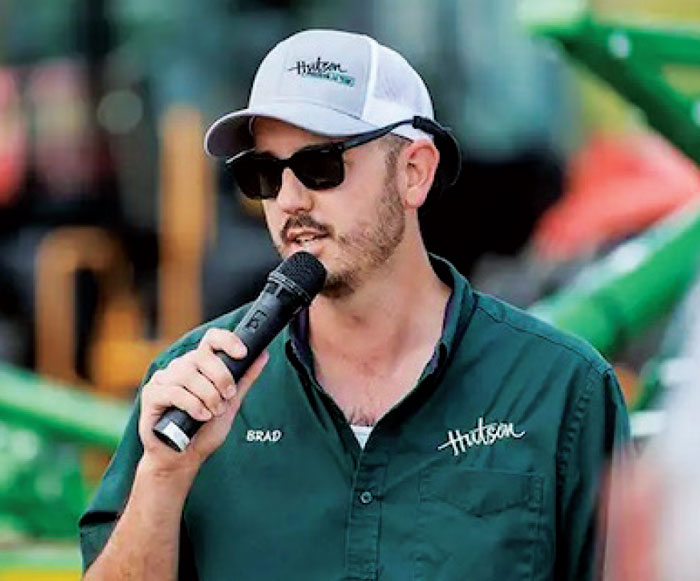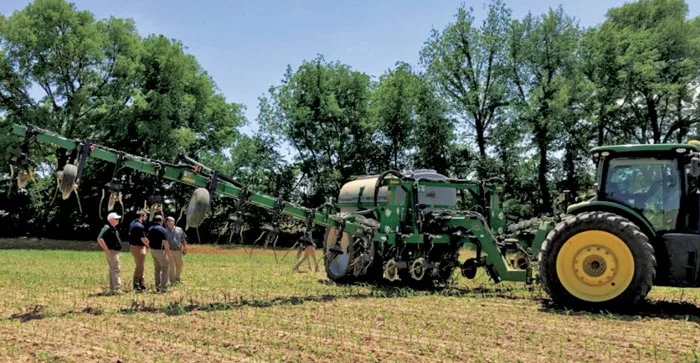I’ve spent the last 20 years working in the ag equipment business with John Deere — the first 10 in the corporate world and the last 10 in the dealership world.
Today, our dealership, Hutson Inc., has 31 total retail locations split from Clarksville, Tenn., to Gaylord, Mich. We are a sales region-based company which means we have no store managers. Each location has a regional sales manager and a regional aftermarket manager. For my precision ag staff, we’ve got team members based within those regions as well. The people aspect of this business is very important. We have 800 employees, and it really is all about them.
The Dream Team
I get the pleasure to work for 33 of the best and most skilled individuals in the precision agriculture business. We have a precision team that’s based in Michigan and a team that’s based in our southern group of stores as well. I also work with our connected support team, which handles all our expert alerts, remote support and service staff support to keep machines up and rolling.
Our precision team is made up of regional precision specialists, agronomists, data managers and sales apprentices within our organization. Most of our staff members are regional precision specialists and data managers. The regional precision specialists are based in the field, working hand in hand with customers and internally. Their job is extremely important because they are the ones doing the bulk of the precision training within our organization.
Growing Pains
Acquisitions are hard to go through. There’s a lot of frustration and a lot of questions about what the future will hold. I’ll be the first to admit that we don’t have all this figured out at Hutson, but I can at least share our playbook.
When we expanded into Michigan, our new stores were really behind the ball when it comes to selling and servicing precision technology. We had locations that were unwilling to sell the latest and greatest technology because customers would say, “Why would I want nozzle control on my sprayer, my old sprayer works just fine?” We encouraged team members to understand that the latest and greatest technology you bring on board can help. If that doesn’t happen, we will fall behind. This is the initial message we preached to our team in Michigan.
How I Trained 18 New Stores in the Middle of Planting Season
Travis Kiesel kicked off the 2024 Precision Farming Dealer Summit with a presentation about his dealership’s creative approach to precision staff and customer education. Click here to watch Kiesel share how he brought 18 new stores up to speed on precision technology during the busiest time of the year.
In the initial stores we acquired, we took 4 of the best technicians in skill, knowledge, and customer relations, and moved them out of service and into roles where they could be most impactful. We moved them into the precision ag team, and they led our training process with staff and customers. They trained our technicians and our account managers. Those 4 technicians were absolutely instrumental in our success. While it’s painful early on to move them out of service, you absolutely need reliable people with boots on the ground leading these training efforts.
‘Hutsonized’ Training
We had to become very strategic about where we were spending our resources after our acquisitions. When you do an acquisition in the month of May, you’re not going to make a bunch of changes before seed goes in the ground in northern Michigan. We took 6-month blocks of time, analyzed what we needed to do before harvest season and put a ton of focus on harvester equipment that first year. We talked a lot about Combine Advisor, and what it could do so that we could be selling it in the early order program. We also spent a lot of time getting our technicians up to speed in the winter.
About 60% of our technicians in Michigan had never been core certified. Almost two-thirds of our technician base did not know the basics of how to work on precision technology and machinery. We noticed that we weren’t looking in the mirror enough. We realized that we must continue to train and challenge ourselves on the precision ag side of things to be successful.
“We didn’t want a playbook from our manufacturer…”
We focused on training our own staff internally. We didn’t want a playbook from our manufacturer. We customized our training playbook to fit Hutson by making it our own — we “Hutsonized” it. There may be a sprayer class that we’re challenged to teach internally, for example. It may be a 1-day sprayer class, or we decide to make it longer, to teach all the content to our employees. We also have a certified dealer program. We have 7 certified dealers across our organization. Those dealers give us the ability to get credits from our manufacturer in teaching various classes.
In 2023, we taught just over 80 certified dealer classes across our organization. Our precision ag team is now spending 50-60% of their time teaching training classes. It’s a tremendous amount of time and expense that we see value in. We’re currently building new training centers in St. Louis, Mich., and Mayfield, Ky. Those 2 facilities will house our training as we go forward. We’ll have the ability to train inside with equipment 12 months out of the year.
We continue to work with local growers as well, so that when we teach a class, we can go in the field for a hands-on lesson. If we’re teaching a sprayers course, we get butts in the seats and in the field working with the sprayer. Even something as simple as a parts person being able to fold and unfold the sprayer is important for us.
In the past, we focused too much on big attendance numbers at field days and clinics. While those events are great, we’ve shifted our focus to targeted customer events. Maybe we only get 12-15 customers at an event, but they’re impactful customers. If we’re teaching about Operations Center, data or variable rate prescriptions, we’ve got 10 customers in there who are using that technology. If we’re doing a combine clinic, we may only have 20-25 customers at that event, but they’re buyers of a Class 7 or 8 combine.
Importance of Mainstreaming
We define mainstreaming as our ability to integrate technology among all our core teams so that that they can use the technology every day. There was a day when our precision ag specialists did everything from pricing, sales, support, set up, install and more. You can’t continue to expect one person to do everything. You will burn great people out if you don’t mainstream technology across the organization.
We’ve taken a fierce approach to defining roles and responsibilities throughout the organization. When it comes to interactions within our parts and service teams, we have a very clear definition of what each department does. We used a tremendous number of resources over the last several years to make sure we’ve got alignment among all the departments in the dealerships. Mainstreaming is key to that success, and it’s all about communication. Every individual must be a good communicator.
“You will burn great people out if you don’t mainstream technology across the organization…”
If everyone in the organization is aware of each other’s roles and responsibilities, it sets a clear path for career differentiation. There may be 3 levels on the career ladder in precision ag, and 2 levels in agronomy. It’s unnerving for an employee to not know what their future looks like. Take the time to map out the career possibilities for each of your employees so they can contemplate what makes sense to them in their long-term career goals going forward.
Mainstreaming also leads to stability. It will create a better retention experience for both your employees on their career path, and your customers, so they get that continuity of service from your dealership. Get creative with your staff and continue to try new things. It’s allowed our organization to branch out into high value crops like asparagus, for example. If you’re mainstreaming the latest technologies to parts, sales and service, it allows your precision ag team to move on to what’s next in the technology world.
Shifting Sales Approach
Our sales team is vital to the profitability of our organization, and we have 50 large ag account managers in the company. Those account managers are 100% commission based. It can be a lucrative commission, and up until a couple of years ago that commission was based solely on equipment sales. It was frustrating at times that our sales force was making money, but they weren’t comfortable enough to go out and support a piece of precision ag equipment, or sell a receiver, or a package with a machine, or the latest technology.
In 2022, we reduced our account manager’s commission by 5%. You can imagine how that went over. We told them, “You can have this back but you’re only going to get it back if you buy in to what we are doing in precision ag. You have to get educated and you have to be selling packages. You also must strategize how you’re going to obtain recurring revenue from your customers.” This definitely opened up everyone’s eyes.

Hutson Inc. taps its most experienced technicians, including certified dealer instructor Brad Peet (pictured above), to train both employees and customers on the latest precision technology. Photo by: Hutson Inc.
We rely on our account managers because they have the best relationships with our customers, and the precision ag team is right there beside them in terms of that relationship. 5% of their commission is based on making sure that they are working the machine and agronomic data aspect of our business. But the biggest piece that they are held responsible for is continuing education. Our account managers must pass an updated internal certification process each year.
Our precision certification process started out as an Operations Center certification, and it’s still evolving today. Our account managers are now expected to go out on the machine, put a work plan together at the computer, get it operational, and get data flowing back to our cloud system. That’s our minimum expectation of an account manager at Hutson.
Our future account managers will come from the precision ag team. Precision certification is being carried out in each department moving forward. We’re going into year 4 of these certifications here in 2024. It’s paramount that our account managers are knowledgeable about precision technology.




![[Technology Corner] A Big Step Forward for Interoperability & Data Sharing](https://www.precisionfarmingdealer.com/ext/resources/2025/12/12/A-Big-Step-Forward-for-Interoperability--Data-Sharing.webp?height=290&t=1765565632&width=400)


